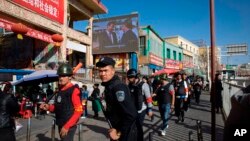General Hing Bun Heang, commander of Prime Minister Hun Sen's bodyguard unit, was the first Cambodian to be sanctioned under the Magnitsky Act along with other alleged human rights abusers from around the world.
The Magnitsky Act was created in 2012 to target Russian officials who were responsible for the death of accountant Sergei Magnitsky, who died in a Russian prison in 2009 after he exposed the corruption in the Russian government. In 2017, the law was expanded to the “Global Magnitsky Act.
“It’s become one of the most important tools we have to fight human rights violations around the world,” Sen. Ben Cardin, who co-authored the law with the late Sen. John McCain, told a forum at the Center for Strategic and International Studies (CSIS) in Washington in mid-December.
Some 101 government officials, businessmen, and institutions in many countries around the world have been sanctioned under the law. The sanctions include visa bans, asset freezes and bans on accessing the US banking system.
“Individual sanctions are important because it’s the individuals who make these decisions and if they can’t bring their wealth here in the United States, keep their wealth here in the United States, believe me, it makes a difference,” Cardin said.
The latest sanctions under the act were placed on 17 Saudi Arabian officials for the murder of Jamal Khashoggi, who worked for the Washington Post. Khashoggi was killed at the Saudi Arabian consulate in Istanbul on October 2 by agents of the Saudi government. Saudi Arabia has denied ordering the killing.
“Its purpose is not just to hold accountable those who perpetrate this violation, but to prevent this type of conduct in the first place,” Cardin added.
Cambodian-American activists hope the Magnitsky Act can fill the gap left by House-sponsored bill HR 5754, which was aimed at promoting democracy and free and fair elections in Cambodia and died in the Senator at the end of 2018.
“Therefore, we hope that even though HR5754 cannot be passed in 2018, the US will expand their sanctions using the Magnitsky Act,” said Pon Saory, CNRP-America spokesman.
Activists called for sanctions on 12 Cambodian army and police generals and four tycoons, who are considered Hun Sen’s inner circle, that Human Rights Watch and Global Witness have identified. These include General Kun Kim, Sao Sokha, Mok Chito, Neth Savoeun and tycoons Mong Rithy, Lao Meng Khin, Ly Yong Phat and Try Pheap.
The US Treasury Department imposed sanctions on Bun Heang in June for repeated human rights abuses, particularly his alleged involvement in the grenade attack on a peaceful demonstration led by opposition leader Sam Rainsy in 1997, during which an American citizen was wounded.
Bun Heang recently told local media that he did not have any assets in the US, goading the Treasury Department to speed up the sanctions process.
“The sanctions violate me and it’s imposed blindly without any consideration,” he said.
Experts who met at the Center for Strategic and International Studies said that sanctions against human rights abusers were intended to prevent the perpetrators from using the US financial system.
“If you don’t have assets, if you don’t have a bank account in the United States, that’s only one small piece of it,” said Joshua White, director of policy and an analyst at Sentry. “At some point, the dollar being the dominant currency worldwide is going to hit the financial system and that we have extra-territorial reach.”
However, there are concerns among human rights activists that President Donald Trump’s administration will only apply sanctions to those who are not US allies and that some human rights abusers may still be free from sanctions.
“My concern with the Global Magnitsky is that we do to some degree see this playing out not across the board,” said Sarah Morgan, Washington director at Human Rights Watch. “I guess it’s more of an art, not a science, but I worry that it is being used against governments that either the US does not have a major security interest in or governments where they don’t feel, the executive branch doesn’t feel they are natural allies.”
Cardin sees the law as potentially more effective if EU can be part of it.
“We need to be more engaged than ever in regards to democratic principles,” he said. “Hate is on the rise. When hate is on the rise, violence is on the rise. Violation of human rights is on the rise.”




